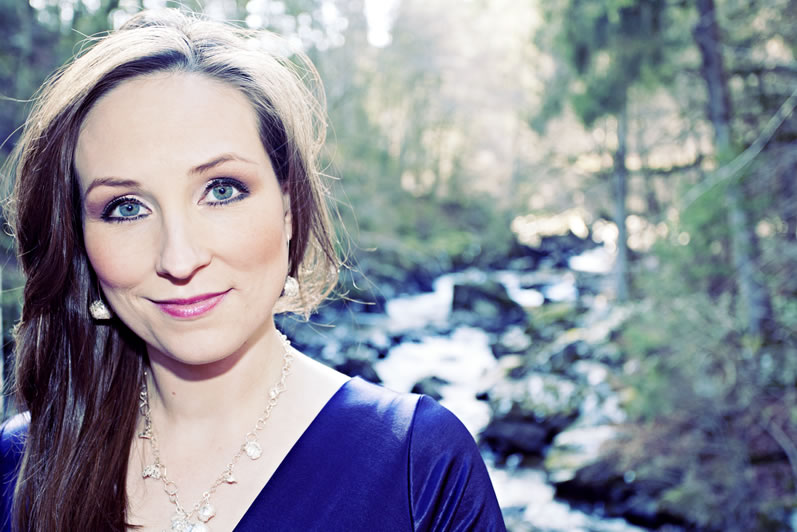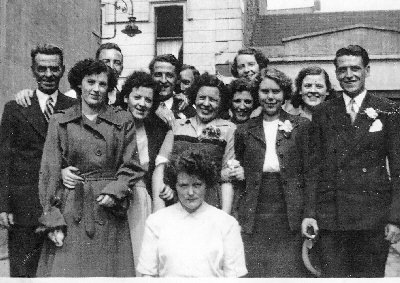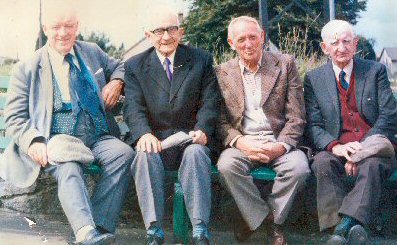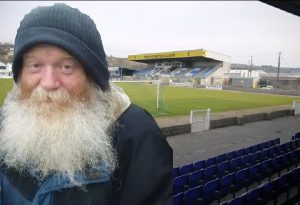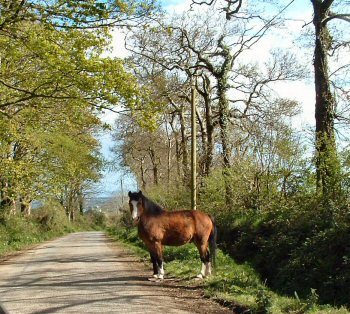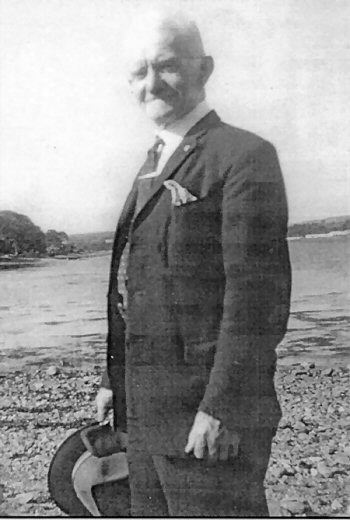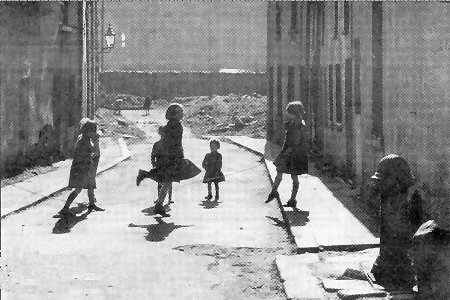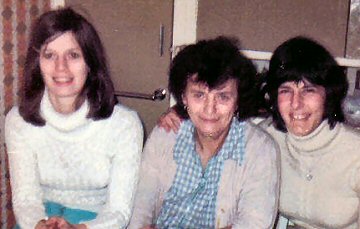Characters
Hughes 1950 Wedding Party
Characters Galore – Marty Bogroll et al.
Hector: Fabian
‘Once’, Fabian went on, ‘my father ordered me on to Hill Street with the handcart laden with herring, to catch the shoppers who mightn’t make it as far as the market.’
‘Pat Phillips, my cousin, who was also selling herrings, protested to the town inspector Mickey Short. He banished me from the scene. Pat’s brother, Larry is still selling there!
The Pedlar
As in most callings there were two or three classes of pedlars. The King of Pedlars was the man who, with a tidy balance at the bank, and an account with some great wholesale drapery house, usually drove a van with a horse along the principal roads of the country and disdained to call on any person lower than the rank of strong farmer. As a rule he was loud, pushing and loquacious, a good salesman and a decent fellow all round.
Then came the pedlar who drove a mule or donkey-cart and who also frequented fairs where his gaudily-decked booth containing coloured, cotton handkerchiefs, cheap muslin and articles of small ware, was a prominent feature. He was more or less looked down on by the big man who drove his horse; but the man with the mule had in turn a corresponding contempt for the poorer brother who, with his pack strapped over his shoulders, sought the favour of his customers on foot. But the latter wayfarer had one advantage over his bigger brethren. He could, and did penetrate further into isolated districts and so reap many small orders from clients who were not so much in touch with highways.
And in truth this latter specimen of the tribe was the most interesting of the lot. He was generally past middle-life with the healthy, hardy glow in his countenance that much living in the open air usually gives. His face seemed so open and truthful that it was difficult to believe he could over-praise his goods or over-reach one in a bargain.
But with all that our pedlar was a man with the shrewd eye to the main chance. It was pleasant to see him approach the open door of the farm-house, and if the time was evening and he contemplated resting for the night, his greeting was doubly voluble and gushing:
Men of the Roads

Mary St Characters
Fabian spoke of one courtly, well-spoken old gentleman, unshaven and wearing a shabby black overcoat who sold second-hand pots and pans in Newry market of old. He also had other rusting kitchenware.
Ethel Fitzpatrick
Ethel Fitzpatrick lives today at Carrick Ard on the Fullerton Road, just yards from where she grew up in High Street. She has contributed a lot to Newry and her people.
She is Past-Chairman of Newry & Mourne Arts Committee, for years presided over Newry Musical Feis and before that again produced prizewinning shows in the popular Top Talent Contests.
Known affectionately by one and all as Miss Ethel, she is a vivacious raconteur and a teacher of high renown. She once turned down an attractive offer to present educational programmes on American television, preferring to live and work in Newry. She was a gifted actress with the Abbey Players and she sparkled in comedies with Newry Musical Society and in a number of pantomimes. She has given elocution classes to hundreds of Newry folk over the decades and she has also conducted the Phoenix Singers. Amongst the hundreds she has inspired with her love of music, dance and the spoken word are Sean Hollywood, Margaret Nolan and Gerard Murphy. The latter in tribute remarked, ‘When she saw how I loved Yeats, she took me to his birthplace in Sligo and showed me the scenes that inspired his poetry.’
Comments in Guestbook here have already shown how much she inspired a wider audience of Newry people. Those privledged few who visited her school classes could feel the sense of mutual love and harmony. There was a certain inevitability about the way her St Clare’s class won the prestigious Harry Heather Trophy at Newry Musical Feis for thirty years in a row.
Her stage career began with the Abbey Players under producer Jimmy Canavan. She joined Michael Mathers, John Bell and Kathleen O’Donnell in presenting O’Casey plays. She had a variety of Newry Musical Society roles opposite Michael Mathers in shows such as ‘Desert Song’ and ‘Rose Marie’. She recalled once having to ride a donkey which was pulled up a ramp at the back of the stage while Terry Rafferty brought up the rear carrying a brush and shovel to gather the droppings.
In the late 50’s she joined with Pat Byrne and Quinn Bennett to form the Newry Pantomime Society which put on productions in the Town Hall (fund-raisers for the new Parochial Hall). Other artists included Charlie Smyth, Irene McCourt and Hugh Magee. With the launch of the Top Talent competitions she took on responsibility for the High Street entries and appeared in comedy sketches. She helped to present Newry’s entry in the Top Towns Competition. A Pub Opera that Miss Ethel organised was televised on the David Frost Show.
When she retired from teaching, members of the choir of Newry Catholic Girls Club, which she had conducted to success at festivals in Belfast and Dublin, gathered to serenade and to honour her. She advised they start anew. They did. They are today’s Phoenix Singers.
Perhaps the least of her achievements was to be serenaded at Stormont Castle by the then Secretary of State Tom King, rendering ‘The Mountains of Mourne’!
It’s comforting to know that Miss Ethel is now enjoying a long-delayed rest!
Women of Newry
It was with astonishment that I realized, on paying tribute to Miss Ethel in this section, how few ladies have so far appeared on Characters pages. Of course my late friend Alice McKay has been lauded, and Newpoint Players have many strong females, past and present, but overall I feel I have been remiss.
Although I am contrite I accept too that our womenfolk have in the past, and the great majority of them also in the present, made their greatest contribution in the home, in rearing our finest citizens and often in the most difficult of times and most stringent of circumstances. May I attempt to make amends by stressing that, regardless of what tributes have already been paid here, or will appear in the future, that this author unreservedly admires and salutes the mothers of Newry, and especially of the poor of Newry over the decades.
I pay especial tribute to my own mother who reared fourteen children by the finest man I have ever known, and one of the most humble. She never in his lifetime had more than a
